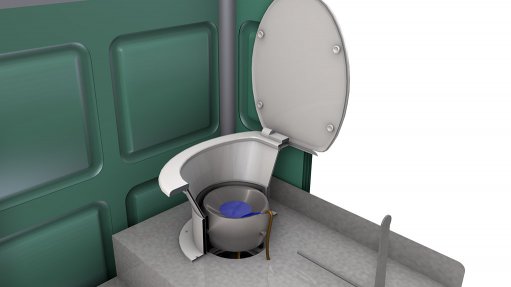
NEW INFORMAL CONCEPT The Nic’s patented rotating bowl is nano-coated, preventing waste matter from sticking to the bowl
Portable sanitation solutions provider Sanitech hopes to start producing its New Informal Concept (Nic) portable toilet solution, which employs a double-sphere rotating bowl, by the end of this month.
Sanitech MD Robert Erasmus tells Engineering News that the rotating bowl, which was patented in February, is nano-coated, preventing waste matter from sticking to the bowl. Also, the design of the bowl prevents unwanted waste material from entering the Nic’s 100 ℓ storage tank, making the solution significantly easier to service.
Erasmus points out that the bowl can also be used to retrofit pit latrines, a solution the company calls Repit, which prevents children from falling into the pits, as well as the spread of airborne diseases.
The Repit solution will have a flexible ‘bladder’ that connects the bowl to the storage tank at the bottom of the pit to prevent groundwater contamination.
Erasmus notes that the two solutions were developed for landowners with limited buying power and in response to the growing need for sanitation in informal settlements.
“The different options are designed to meet the requirements of different applications. The Nic solution is ideal for informal settlements, as it is prohibited to dig a hole on land that you do not own. However, if the application is a small household with an existing pit latrine, then the Repit solution is a viable option,” he asserts, adding that both solutions are cost effective and require no water to flush, which reduces operating expenses.
Moreover, the Nic solution has a 20 ℓ water tank in the side panel for hand washing.
Erasmus notes that the Nic solution is suitable for industrial applications. He tells Engineering News that Sanitech has received an order for 250 Nic solutions from a gold mine in Carletonville, Gauteng.
The Repit is currently in the development stages and Sanitech is waiting for a prototype to test the concept.
Future Markets
Erasmus points out that South Africa’s wastewater treatment plants are increasingly under distress, with only about 60% of the country’s plants fully operational.
Owing to this decline, there are fewer wastewater treatment plant service providers, such as Sanitech, which help companies to legally dispose of waste, he says. This, in turn, forces service providers to travel significantly further to meet clients’ sanitation needs.
Meanwhile, Sanitech supplies 1 200 portable toilets to State-owned power utility Eskom’s Kusile power plant. The company also provides waste disposal services to the plant, which amounts to about 5 000 ℓ of septic work a month.
Erasmus says the Phola Park dumpsite, about 12 km away from the plant, currently only has a general authorisation permit and not the required water-use licence for its capacity. The company is, therefore, not allowed to dump waste there and had to transport the waste about 50 km to Seekoeigat, in Pretoria, to be dumped.
The company is also aiming to expand into Africa, though Erasmus mentions that the lack of wastewater treatment facilities in several African countries, such as Mozambique and Angola, has significantly limited the feasibility of Sanitech offering its services effectively.
He further points out that, in response to wastewater challenges both locally and in the rest of Africa, Sanitech recruited State-owned water utility Rand Water experimental facilities process technology head Gerhard Britz in December last year to design a portable sanitation plant that could be placed at either a construction site or at Sanitech’s premises. The solution will treat water, which can be repurposed for other industrial applications – except for drinking – to significantly reduce the water consumption of mega infrastructure projects.
“This will not only significantly reduce the distance we need to travel, but will also support our expansion goals in Africa,” he avers.
Sanitech hopes to have a working prototype of the solution by the end of this year.